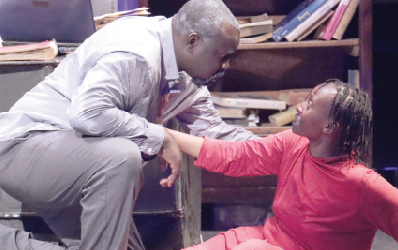Play ‘The Dying Need No Shoes’ heavy messages

The month of May carried with it jaw dropping performances that would have left anyone at the edge of their seat. Being a mental health month, it hosted a vast number of shows that either directly or indirectly touched on mental health. Shows such as Backstreet told a story of love and loss with a twist. It showed clearly the implications of what death could do to those left behind and the effects of war on the minds and lives of soldiers.
Then came Dzaddylutions, a live band musical theatre show that doubled as an artistic tribute for a key member of the group who passed away just when the group was preparing to launch an album. The show was one way that the band members chose to seek closure and deal with the death.
Caught unawares
Mental health is a problem that has for a long time been overlooked. Many people are in many instances caught unawares that family members or friends are depressed and in need of assistance. It is only when they are confronted with a tragedy that they realise there was a problem and the response is always “we wouldn’t have guessed there was a problem. We didn’t know.”
There are instances where we might not know how to speak about mental health, but one way to speak about it is through theatre.
“Mental health month really means a lot, because we all suffer from something. And we all really need that mental head space, which we must give time to in order to understand and to get to know who we are,” says theatre director Alacoque Natome.
What a better way to wrap up the month than through Fred Mbogo’s The Dying Need No Shoes. The performance was staged at the Kenya National Theatre (KNT) in Nairobi and had a unique set up; they had some of the audience members sit on the stage as the play was staged.
“I really enjoyed how inclusive it was by having some of us on stage. I think the assistant director really pointed it out. It gave that inclusivity and relatability to the story,” Mary Irungu, an audience told Spice.
The play was a two hander, that is, it only had two actors in Ben Tekee (Prof Munanda) and Clare Wahome (Purity). Mbogo believes this enhanced the detail and ensures quality. The theatrical piece told the story of Purity, 21, a university student that gets into a heated argument with her father who just saved her from dying by suicide.
Elephant in the room
The two then get into a heated argument that slowly reveals the family secrets they hid within them and their troubling relationship. The play touched on various topics that often our societies tend to shun upon, which included incest, gender-based-violence (GBV), ‘sexually transmitted marks’ (common with campus students) and the effect of death on those left behind.
“I extremely enjoyed the play. I want to sit down with the writer and ask him how he thought all this out. It was mind blowing! Beyond that it’s something everyone can relate to, because chances are that you have dealt with some form of mental illness or mental health issues,” Mark Irungu commented.
The Dying Need No Shoes has stood the test of the time. The play has been around for over a decade now, and has been staged several times before at the KNT.
“This is an old play. Because of the ageing of the play, a few things might need rebooting because the internet has really changed things. But the bigger issues still exist; you know for example incest, GBV and ‘sex for marks’ in the university are still rife. Even if it is an old play, these things still exist, still valid and relevant. In fact, I have been accused of being a one hit wonder or should I say writer? I have written other plays, just not as popular as this one,” intimates Mbogo, the playwright.
He further says that for him, it’s all about telling a story that would bring an impact in a positive way.
He says in conclusion, “I am just telling a story. When you tell a story, and you are not necessarily telling someone to change how they think about something, you are just telling a story. There is pleasure when you are telling a story and there is pleasure in listening to it. When it starts being used for impact, for shedding light on certain things, then that is another whole world. And the first thing I ask myself when I want to tell a story is, “is it a valid story?”












